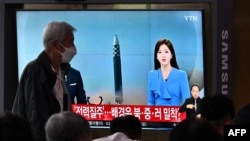North Korea launched eight short-range ballistic missiles early Sunday, South Korea’s military reported, a significant intensification of missile testing during what has already been one of the North’s busiest years for launches.
North Korea fired the salvo of missiles between 9:08 and 9:43 a.m. local time, according to South Korea’s military.
It is North Korea’s 18th round of missile launches this year – a show of force that U.S. and South Korean officials say could soon include a nuclear weapons test.
The North Korean launches came after the United States and South Korea held a major military exercise in the waters off Japan’s coast.
The three-day exercise, which involved the nuclear-powered USS Ronald Reagan aircraft carrier, was meant to bolster the allies’ capabilities against North Korea’s provocations, South Korea’s military said.
South Korea’s new conservative president, Yoon Suk Yeol, has called for larger joint military exercises to deter the nuclear-armed North Korea.
In response to the latest missile tests, South Korea’s presidential office held an emergency meeting of the country’s National Security Council and strongly condemned the launches.
Why it is testing
North Korea has test-fired missiles at a rapid pace this year, apparently in an attempt to make progress on a weapons development wish list laid out by leader Kim Jong Un in 2021.
This year alone, North Korea has tested long-range cruise missiles, a submarine-launched ballistic missile, intercontinental ballistic missiles, and what it described as hypersonic missiles.
Many of the advancements appear intended to make it much harder for the United States and its allies to detect, track, and intercept the weapons.
Sunday is the first time North Korea has launched eight missiles at once, according to defense experts who track North Korea’s weapons program.
“This sounds like exercises more than new technology,” said Melissa Hanham, an affiliate at Stanford University’s Center for International Security and Cooperation.
In the past, Kim has overseen the launch of multiple missiles during field tests meant to see how quickly and accurately the launches could be conducted. During those tests, North Korea practiced to distances in the sea that were equivalent to hitting the South Korean city of Busan or U.S. bases in Japan, Hanham said.
“We’ve never seen 8 at once before, though,” she added.
According to South Korea’s military, the missiles flew about 110 to 670 kilometers, reached an altitude of 25 to 90 kilometers, and traveled at speeds of Mach 3 to Mach 6.
Japan’s minister of defense, Nobuo Kishi, said at least one of the missiles had an irregular trajectory, suggesting it could be designed to evade missile defenses.
North Korean state media have not commented on the latest launch. Typically, the country does not disclose its missile tests until the following day in state media. However, it has made no such announcement following several recent tests.
Pyongyang appears to be attempting to create a sense of normalcy around its missile tests, insisting it is no different than other countries that regularly test weapons.
However, North Korea is prohibited from any ballistic missile activity under a series of United Nations Security Council resolutions.
North Korea has said it does not acknowledge the U.N. resolutions.
COVID-19 outbreak
The intensified North Korean missile testing comes as the country grapples with a coronavirus outbreak. North Korea last month admitted it had detected cases of COVID-19, following two years of denials.
Although North Korean state media say the pandemic situation is improving, the World Health Organization last week said it assumes the outbreak is growing worse, not better.
A serious COVID-19 outbreak could be devastating for North Korea, which lacks medical resources and even at times basic items such as electricity.
North Korea has repeatedly ignored offers of vaccines from COVAX, the U.N.-backed vaccine distribution effort.
However, Gavi, the vaccine alliance that helps run COVAX, said in a statement to VOA that it “understands” North Korea “has accepted an offer of vaccines from China and has started to administer doses.” It offered no other details.
North Korea’s battle with COVID-19 has not slowed the country’s weapons tests. Since acknowledging the outbreak on May 12, North Korea has launched at least 14 missiles during three rounds of launches.
“Very good odds of 2022 now becoming the busiest year of missile-testing in North Korean history,” tweeted Ankit Panda, a senior fellow at the Carnegie Endowment for International Peace.
U.S. and South Korean officials say North Korea is also preparing to conduct its seventh nuclear test. It would be the country’s first nuke test since 2017.




